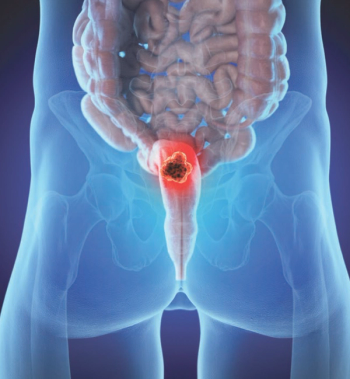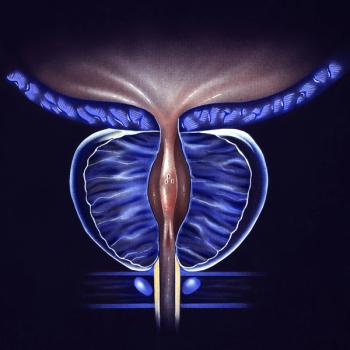
Supporting results for the approval of taletrectinib in ROS1+ NSCLC come from the TRUST-I and TRUST-II trials.

Your AI-Trained Oncology Knowledge Connection!


Ariana Pelosci, managing editor for CancerNetwork® and the journal ONCOLOGY®, has been with the team since June 2021. She specializes in both web and print, and runs the social media accounts for CancerNetwork®.
She graduated from the University of Delaware, where she studied Media Communications and minored in journalism and marketing. At heart, she is a Jersey girl, and you can always find her down the shore during her free time.
Ariana loves to read, specifically historical or contemporary fiction. Follow Ariana on Twitter @APelosci or email her at apelosci@mjhlifesciences.com.

Supporting results for the approval of taletrectinib in ROS1+ NSCLC come from the TRUST-I and TRUST-II trials.

For patients with unresectable vulvar cancer, an improved ORR was observed with pembrolizumab plus cisplatin and RT followed by maintenance pembrolizumab.

Results from part 1 dose level G of the MagnetisMM-6 trial found elranatamab, daratumumab, and lenalidomide to be safe and manageable in NDMM.

Results from the ShorTrip trial found that SCRT plus chemotherapy regimens showed promising efficacy for patients with locally advanced rectal cancer.

“Higher pretreatment HER2 amplicon mRNA signature and HER2 protein expression predicted improved outcomes with T-DXd for [metastatic breast cancer],” Paolo Tarantino, MD, PhD, said.

SBRT did not significantly impact response when added to nivolumab/ipilimumab for patients with mCRPC.

Results from the KRYSTAL-7 trial showed that efficacy was improved with adagrasib/pembrolizumab for KRAS G12C-mutated NSCLC.

Results from the NIVOPOSTOP trial found improved DFS with adjuvant nivolumab plus cisplatin and RT for patients with LA-SCCHN.

Amivantamab/chemotherapy remained efficacious regardless of the osimertinib resistance mechanism for patients with EGFR-mutated NSCLC.

Andrew Brenner, MD, PhD, discussed rhenium obisbemeda and results from the ReSPECT-GBM trial for patients with glioblastoma.

Oncodermatology is critical in managing adverse effects from cancer treatments, specifically targeted therapies and immunotherapies.

There was a 7% lower incidence of obesity-related cancer with GLP-1 receptor agonist use.

ODAC has voted against the use of UGN-102 intravesical solution for patients with advanced bladder cancer.

Kit Yu Lu, MD, discusses the applications of T-DXd and sacituzumab govitecan for patients with breast cancer.

Shannon L. Puhalla, MD, delves into the clinical application, efficacy, and safety profiles of T-DXd and sacituzumab govitecan for patients with breast cancer.
!["[The Teal Wand] offers an evidence-based way to expand access [to screening] without compromising accuracy,” according to Christine Conageski, MD, MSc, from the University of Colorado Anschutz Medical Campus.](https://cdn.sanity.io/images/0vv8moc6/cancernetwork/c41c601528cfbdb8b14b609e326649f33f596c38-1200x675.jpg?w=350&fit=crop&auto=format)
Teal Wand showed a 95% positive percent agreement when screening for cervical cancer.

Data from the LITESPARK-015 trial supported the FDA’s decision to approve belzutifan monotherapy in patients with advanced, unresectable, or metastatic PPGL.

Jennifer Moliterno, MD, FAANS, discusses current neurosurgical strategies for newly diagnosed high-grade gliomas.

Nicholas Blondin, MD, provides an in-depth discussion on the evolving role of immunotherapy in the treatment of primary and metastatic brain tumors.

A new type of robotic posterior surgery has been shown to be a treatment option for patients with devastated bladder outlets.

Utilizing a multidisciplinary breast cancer clinic helped improve time to first appointment and time to first treatment.

IBTR with the 1 mm and 2 mm cutoff found rates found the margin widths were small and not clinically meaningful.

Ninety days of endocrine therapy before surgery could change patient/surgeon preference on concurrent radiation use in those with breast cancer.

18F-FDG PET/CT staging of lymph node metastases in patients with bladder cancer undergoing radical cystectomy did not correlate with worse survival outcomes.

The combination of nurulimab plus prolgolimab enhanced PFS, ORR, and DCR compared with prolgolimab monotherapy in unresectable or metastatic melanoma.

Toxicity complications were assessed between single- and multiple-treatment modalities for patients with localized prostate cancer.

Anna Greene, PhD, highlights the NETRF’s role as the largest funder of NET research, their current research funding opportunities, and its commitment to patient support.

ctDNA levels may help to predict early recurrence for patients with stage III melanoma before adjuvant therapy and during follow-up.

William Kennedy, MD, discussed modern radiosurgery techniques, technology selection, and the multidisciplinary approach for treating complex CNS tumors.

Administering 177Lu for mCRPC is a “team sport”, according to Steven Finkelstein, MD, DABR, FACRO.